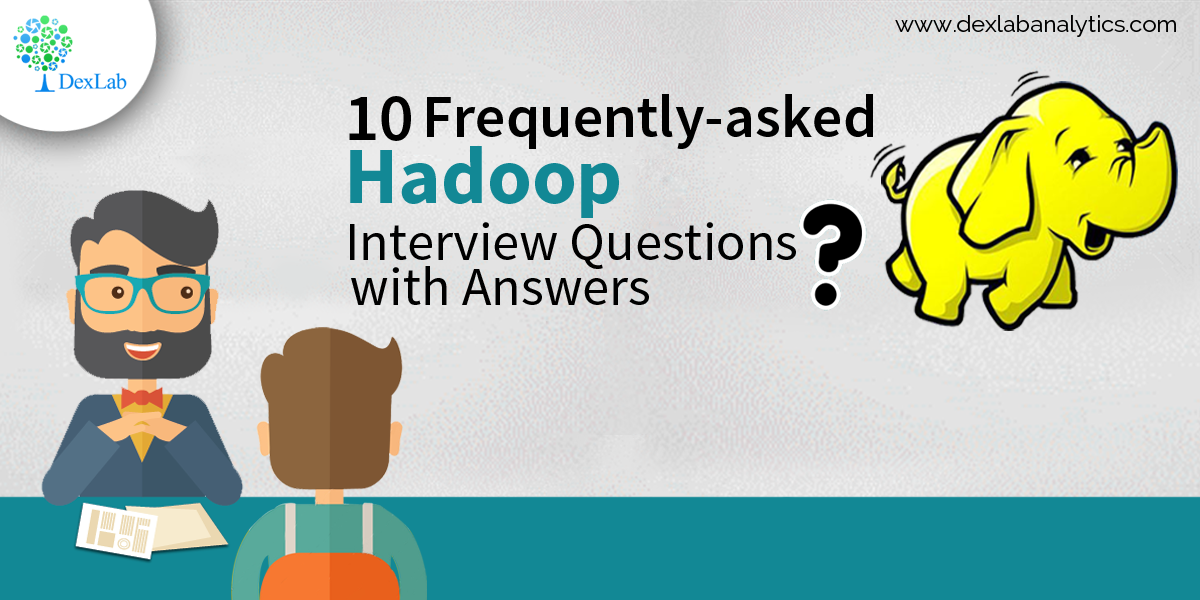A substantial part of the Apache project, Hadoop is an open source, Java-based programming software framework that is used for storing data and running applications on different clusters of commodity hardware. Be it any kind of data, Hadoop acts as a massive storage unit backed by gargantuan processing power and an ability to tackle virtually countless tasks and jobs, simultaneously.
In this blogpost, we are going to discuss top 10 Hadoop interview questions – cracking these questions may help you bag the sexiest job of this decade.
What are the components of Hadoop?
There are 3 layers in Hadoop and they are as follows:
- Storage layer (HDFS) – Also known as Hadoop Distributed File System, HDFS is responsible for storing various forms of data as blocks of information. It includes NameNode and DataNode.
- Batch processing engine (MapReduce) – For parallel processing of large data sets across a standard Hadoop cluster, MapReduce is the key.
- Resource management layer (YARN) – Yet Another Resource Negotiator is the powerful processing framework in Hadoop system that keeps a check on the resources.
Why is Hadoop streaming?
Hadoop distribution includes a generic application programming interface for drawing MapReduce jobs in programming languages like Ruby, Python, Perl, etc. and this is known as Hadoop streaming.
What are the different modes to run Hadoop?
- Local (standalone) Mode
- Pseudo-Distributed Mode
- Fully-Distributed Mode
How to restart Namenode?
Begin by clicking on stop-all.sh and then on start-all.sh
OR
Write sudo hdfs (then press enter), su-hdfs (then press enter), /etc/init.d/ha (then press enter) and finally /etc/init.d/Hadoop-0.20-name node start (then press enter).
How can you copy files between HDFS clusters?
Use multiple nodes and the distcp command to ensure smooth copying of files between HDFS clusters.
What do you mean by speculative execution in Hadoop?
In case, a node executes a task slower, the master node has the ability to start the same task on another node. As a result, the task that finishes off first will be accepted and the other one will be rejected. This entire procedure is known as “speculative execution”.
What is “WAL” in HBase?
Here, WAL stands for “Write Ahead Log (WAL)”, which is a file located in every Region Server across the distributed environment. It is mostly used to recover data sets in case of mishaps.
How to do a file system check in HDFS?
FSCK command is your to-go option to do file system check in HDFS. This command is extensively used to block locations or names or check overall health of any files.
Follow
hdfs fsck /dir/hadoop-test -files -blocks –locations
What sets apart an InputSplit from a Block?
A block divides the data, physically without taking into account the logical equations. This signifies you can posses a record that originated in one block and stretches over to another. On the other hand, InputSplit includes the logical boundaries of records, which are crucial too.
Why should you use Storm for Real-Time Processing?
- Easy to operate – simple operating system makes it easy
- Fast processing – it can process around 100 messages per second per node
- Fault detection – it can easily detect faults and restarts functional attributes
- Scores high on reliability – expect execution of each data unit at least for once
- High scalability – it operates throughout clusters of machines
The article has been sourced from – www.besthadooptraining.in/blog/top-100-hadoop-interview-questions
Learn how Big Data Hadoop can help you manage your business data decisions from DexLab Analytics. We are a leading Big Data Hadoop training institute in Delhi NCR region offering industry standard big data related courses for data-aspiring candidates.
Interested in a career in Data Analyst?
To learn more about Data Analyst with Advanced excel course – Enrol Now.
To learn more about Data Analyst with R Course – Enrol Now.
To learn more about Big Data Course – Enrol Now.To learn more about Machine Learning Using Python and Spark – Enrol Now.
To learn more about Data Analyst with SAS Course – Enrol Now.
To learn more about Data Analyst with Apache Spark Course – Enrol Now.
To learn more about Data Analyst with Market Risk Analytics and Modelling Course – Enrol Now.

